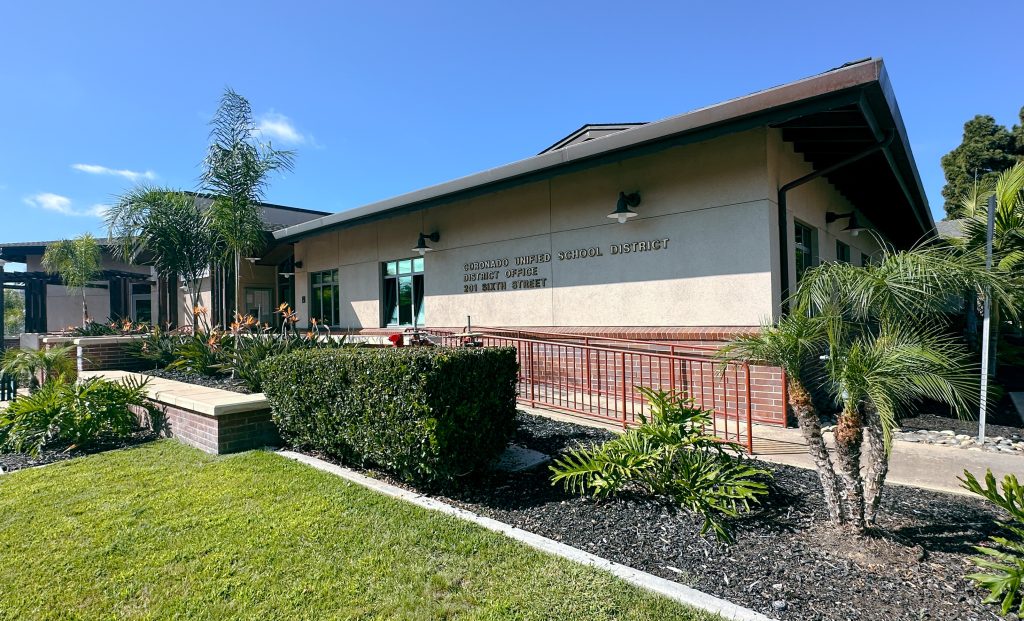The Coronado Unified School District (CUSD) reached an agreement with the Association of Coronado Teachers at a special meeting of the board on November 18, approving a 4% pay increase effective January 2025. This includes a retroactive pay increase of 3% from July 1, 2024 until January.
While CUSD trustees voted unanimously to approve the agreement, several said the process was unnecessarily long and contentious, pitting the district’s dire financial position against the needs of the teachers.
“I wish the district could afford to give the pay raise teachers requested. Teachers deserve to be paid more; however, as a trustee, I have a fiduciary responsibility for keeping our district solvent and maintaining core programs for our students,” said Board President Alexia Palacios-Peters. “The reality of our budget from the beginning of this process was that the district was limited in what it could afford for salary negotiations.”
The 4% raise was a far cry from the 11% pay increase originally asked by the Association of Coronado Teachers (ACT) in March. The teachers later dropped their ask slightly to 10%. At the school board meeting in June, ACT President Jennifer Landry shared that teachers were struggling; some were working multiple jobs and getting help from food banks just to make ends meet.
When the fact-finding process showed that a 10% pay increase would cripple the district financially, ACT agreed to a 4% raise with no concessions. Last week, ACT shared that its members had approved the tentative agreement on a social media post.
“The agreement enhances teaching and learning conditions,” Landry wrote in a message after the meeting. “However, there is more work to do to be able to recruit and retain the best educators for our students. We plan to continue this work … in the next round of our negotiations.”
But the agreement, according to Palacios-Peters, will already challenge the district’s stressed budget, increasing the budget shortfall from $2.3 million to $3.8 million. As directed by the San Diego County Office of Education, the district needs to land in Basic Aid (whereby the district will be fully-funded by local property taxes) with a minimum of 3% reserves. CUSD hopes to reach Basic Aid in the 2027-2028 school year.
“This agreement puts us in a bigger hole than we were already in,” said Palacios-Peters. “I know that going forward, we will be looking at making additional cuts as early as the December 2024 meeting.”
She shared that teacher negotiations have cost the district more than $26,000 in legal fees, and that number is likely to rise. But there are other costs.
“Unfortunately, this negotiation cycle came with additional costs…strained relationships, distrust and time, either teachers being out of their classrooms, or administrators having their focus taken away from their respective sites or departments,” she said.
Trustee Scot Youngblood shared that, although he’s glad negotiations are over, the district will likely have to make some “very uncomfortable” decisions in the coming months.
“I also think it’s unfortunate that [ACT] wanted to go fact-finding from the very beginning, which creates distrust in the numbers…it means you don’t believe the facts as presented by the district and the deputy district superintendent and the business department,” said Youngblood.
Landry agreed that the negotiations dragged on much longer than expected.
“The process was drawn out much longer than it ever needed to be, and hopefully, in the future, this will not occur again,” wrote Landry.
Trustee Mal Sandie said the board wanted to do everything it could to compensate the teachers, and trustee Renee Cavanaugh acknowledged both the importance and challenge of labor negotiations.
“I’m hoping that we have a more collaborative working relationship next time; I think that’s really important,” said Cavanaugh.
Trustee Whitney Antrim said she was happy for the resolution, although the entire process was distressing, and it was both “rancorous” and “unpleasant.” She suggested future board members and representatives develop a set of ground rules based on a shared set of facts before negotiations begin.
“I’m glad we are where we are, and I hope the reductions that need to be made won’t hurt our students,” she said.






The Coronado Cays improvement plan (not just maintenance) comes in at millions of dollars. More or less equal to the school district shortfall. So a question, would you rather have smart kids using an ok park or dumb ones using a great one? Education should be the number one priority. That’s my $0.02.